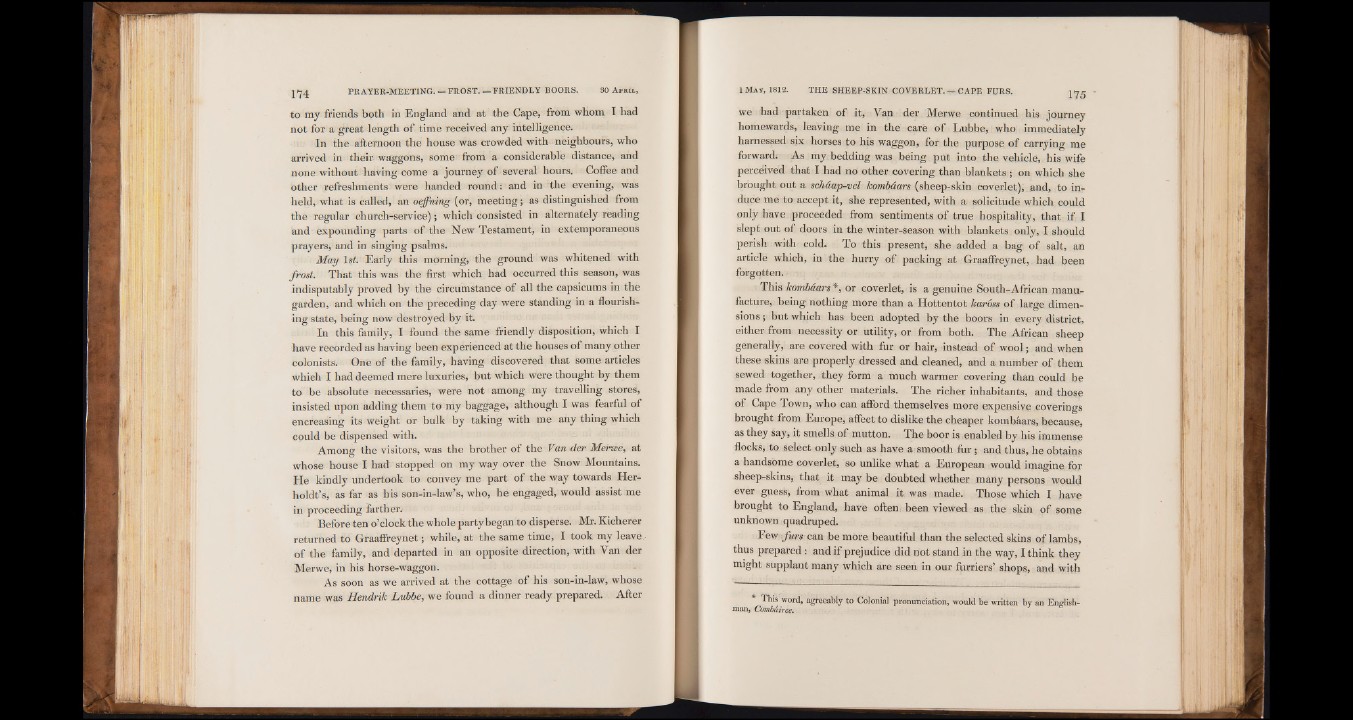
7 7 4 PRAYER-MEETING. — FROST.— FRIENDLY BOORS. 80 April,
to my friends both in England and at the Cape, from whom I had
not for a great length of time received any intelligence.
In the afternoon the house was crowded with neighbours, who
arrived in their waggons, some from a considerable distance, and
none without having come a journey of several hours. Coffee and
other refreshments were handed round: and in the evening, was
held, what is called, an oeffhing (or, meeting; as distinguished from
the regular church-service); which consisted in alternately reading
and expounding parts of the New Testament, in extemporaneous
prayers, and in singing psalms.
May 1st. Early this morning, the ground was whitened with
frost. That this was the first which had occurred this season, was
indisputably proved by the circumstance of all the capsicums in the
garden, and which on the preceding day were standing in a flourishing
state, being now destroyed by it.
In this family, I found the same friendly disposition, which I
have recorded as having been experienced at the houses of many other
colonists. One of the family, having discovered that some articles
which I had deemed mere luxuries, but which were thought by them
to be absolute necessaries, were not among my travelling stores,
insisted upon adding them to my baggage, although I was fearful of
encreasing its weight or bulk by taking with me any thing which
Could be dispensed with.
Among the visitors, was the brother of the Van der Merwe, at
whose house I had stopped on my way over the Snow Mountains.
He kindly undertook to convey me part of the way towards Herholdt’s,
as far as his son-in-law’s, who, he engaged, would assist me
in proceeding farther.
Before ten o’clock the whole party began to disperse. Mr. Kicherer
returned to Graaffreynet; while, at the same time, I took my leave,
of the family, and departed in an opposite direction, with Van der
Merwe, in his horse-waggon.
As soon as we arrived at the cottage of his son-in-law, whose
name was Hendrik Lubbe, we found a dinner ready prepared. After
1 May, 1812. THE SHEEP-SKIN COVERLET.4-CAPE FURS. yf i r -
we had partaken of it, Van der Merwe continued his journey
homewards, leaving me in the care of Lubbe, who immediately
harnessed six horses to his waggon, for the purpose of carrying me
forward; As my bedding was being put into the vehicle, his wife
perceived that I had no other covering than blankets; on which she
brought out a schdap-vel kombaars (sheep-skin coverlet), and, to induce
me to accept it, she represented, with a solicitude which could
only have proceeded from sentiments of true hospitality, that if I
slept out of doors in the winter-season with blankets only, I should
perish with cold. To this present, she added a bag of salt, an
article which, in the hurry of packing at Graaffreynet, had been
forgqtten.;
This kombaars*, or coverlet, is a genuine South-African manufacture,:
being nothing more than a Hottentot kaross of large dimensions
5 but which has been adopted by the boors in every district,
either from necessity or utility, or from both. The African sheep
generally, are covered with fur or hair, instead of wool; and when
these skins are properly dressed and cleaned, and a number of them
sewed together, they form a much warmer covering than could be
made from any other materials. The richer inhabitants, and those
of Cape Town, who can afford themselves more expensive coverings
brought from Europe, affect to dislike the cheaper kombaars, because,
as they say, it smells of mutton. The boor is enabled by his immense
flocks, to select only such as have a smooth fur; and thus, he obtains
a handsome coverlet, so unlike what a European would imagine for
sheep-skins, that it may be doubted whether many persons would
ever guess, from what animal it was made. Those which I have
brought to England, have often, been viewed as the skin of some
unknown quadruped.
Few furs can be more beautiful than the selected skins of lambs,
thus prepared; and if prejudice did not stand in the way, I think they
might supplant many which are seen in our furriers’ shops, and with
* This word, agreeably to Colonial pronunciation, would be man, Coml&irce. . writ.ten by an English